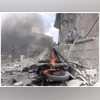Syrian rebels were poised to press their lightning advance on Saturday after reaching the edge of the central city of Homs, with government forces attempting to buttress collapsing frontlines and save President Bashar al-Assad's 24-year rule.
Since the rebels' sweep into Aleppo a week ago, government defences have crumbled across the country at dizzying speed as insurgents seized a string of major cities and rose up in places where the rebellion had long seemed over.
Besides capturing Aleppo in the north, Hama in the centre and Deir al-Zor in the east, rebels rose up in southern Suweida and Deraa, saying on Friday they had taken control of the two cities and posting videos showing insurgent celebrations there.
Syria's military said it was carrying out airstrikes around Hama and Homs and reinforcing on that front. It also said it was repositioning around Deraa and Suweida, without acknowledging their capture by rebels.
The pace of events has stunned Arab capitals, Western officials say, raising their fears of a fresh wave of regional instability.
Syria's civil war, which erupted in 2011 as an uprising against Assad's rule, dragged in big outside powers, created space for jihadist militants to plot attacks around the world and sent millions of refugees into neighbouring states.
Also Read
Western officials say the Syrian military is in a difficult situation, unable to halt the rebel gains and forced into retreat.
Assad had long relied on allies to subdue the rebels, with Russian warplanes bombing from the skies while Iran sent allied forces including Lebanon's Hezbollah and Iraqi militia to bolster the Syrian military and storm insurgent strongholds.
But Russia has been focused on the war in Ukraine since 2022 and Hezbollah's leadership has been decimated this year in its own gruelling war with Israel.
Russia on Friday urged its nationals to leave the country.
Iran evacuated families of diplomats from Syria, an Iranian official said.
Hezbollah has sent some "supervising forces" to Homs on Friday but any significant deployment would risk exposure to Israeli airstrikes, Western officials said. Israel attacked two Lebanon-Syria border crossings on Friday, Lebanon said.
Iran-backed Iraqi militias are on high alert, with thousands of heavily armed fighters ready to deploy to Syria, many of them amassed near the border. But they have not yet been ordered to cross, two of their commanders said. Iraq does not seek military intervention in Syria, a government spokesman said on Friday.
Iran, Russia, and Turkey, which is the main foreign supporter of the rebels, will meet on Saturday to discuss the crisis in Syria, a diplomatic source said on Friday.
Qatar's Foreign Minister Sheikh Mohammed bin Abdulrahman Al Thani said there had been no serious effort by Assad to reconcile with his own people and that civil war threatened Syria's territorial integrity.
BATTLE FOR HOMS
The rebels said they were "at the walls" of Homs after taking the last village on its northern outskirts late on Friday, a day after seizing nearby Hama following a brief battle outside the city.
Inside Homs, a resident said the situation had felt normal until Friday, but had grown more tense with the sound of airstrikes and gunfire clearly audible and pro-Assad militia groups setting up checkpoints.
"They are sending a message to people to keep in line and that they should not get excited and not expect Homs to go easily," the resident said.
Seizing Homs, a key crossroads between the capital and the Mediterranean, would cut off Damascus from the coastal stronghold of Assad's minority Alawite sect, and from a naval base and air base of his Russian allies there.
Rebels outside Homs came under intense bombardment overnight and the military and its allies were attempting to dig in for a defence of the city, both sides said.
A coalition of rebel factions that include the Islamist group Hayat Tahrir al-Sham (HTS) made a last call on forces loyal to Assad's government in Homs to defect.
Ahead of the rebel advance, thousands of people fled Homs towards the coastal regions of Latakia and Tartus, strongholds of the government, residents and witnesses said.
"Homs is the key. It will be very hard for Assad to make a stand but if Homs should fall, the main highway from Damascus to Tartus and the coast will be closed, cutting the capital off from the Alawite Mountains," said Jonathan Landis, a Syria specialist at the University of Oklahoma.
"But the Syrian army won't fight. No one wants to die for Assad and his regime," he added.
Taking Deraa and Suweida in the south could allow a concerted assault on the capital, the seat of Assad's power, military sources said.
Rebel sources said on Friday the military had agreed to make an orderly withdrawal from Deraa under a deal giving army officials safe passage to the capital Damascus, about 100 km (60 miles) north.
Deraa, which had a population of more than 100,000 before the civil war began 13 years ago, holds symbolic importance as the cradle of the uprising. It is the capital of a province of about 1 million people, bordering Jordan.
In the east, a U.S.-backed alliance led by Syrian Kurdish fighters captured Deir el-Zor, the government's main foothold in the vast desert, on Friday, three Syrian sources told Reuters, jeopardising Assad's land connection to allies in Iraq.
(Only the headline and picture of this report may have been reworked by the Business Standard staff; the rest of the content is auto-generated from a syndicated feed.)
)